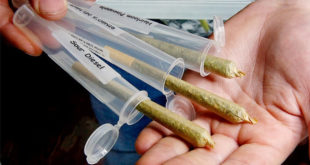
By Gloria Rebecca Gomez, Arizona Mirror
Arizonans with autism and post-traumatic stress disorder could add marijuana to their medical toolkit under a proposal that expands who can access the drug.
Currently, people with severe medical conditions such as cancer, Alzheimer’s disease or seizures can apply for a medical marijuana card. While adult recreational use is legal in the Grand Canyon state since Arizonans voted to allow it in 2020, qualifying for a medical marijuana card means lower prices, shorter wait times and being allowed to purchase more.
Senate Bill 1466 extends those benefits to Arizonans who suffer from PTSD or live with autism. As many as 20 states include PTSD on their list of conditions to access cannabis via a medical license, and 14 states have prescribed it as a treatment for autism.
The proposal drew widespread bipartisan support in the Arizona Senate earlier this month, and on Monday it moved past its first hurdle in the state House of Representatives, propelled forward by the pleas of parents.
Christina Flynn told members of the House Health and Human Services Committee that her autistic son’s life was drastically improved after being allowed to use marijuana.
Arizona doesn’t currently include autism among those who are allowed to access medical marijuana, and only those 21 or older may use recreational marijuana, but some symptoms that accompany autism may qualify for the treatment, such as seizures.
Flynn’s son, who has been diagnosed with severe autism, used to suffer from repeated rage attacks and self-injurious behaviors. Six antipsychotic drugs failed to resolve those issues, but marijuana worked where other treatments didn’t.
“He used to attack people about 30 times a day,” she said. “For the last 18 months, he’s attacked no one.”
The core cause of autism is still unknown, and medications are generally prescribed to treat the symptoms of the condition, which can include anxiety or aggression. In more severe cases, the medications often offer little relief.
For Aaron Jacobs, a dad of a nine-year-old son with severe autism, marijuana is preferable to the side effects of the medications that are commonly used. Risperidone and Aripiprazole are two of the most frequently prescribed, and are the only FDA-approved medications to treat aggression and irritability in individuals with autism. Side effects include a weakened heartbeat, muscle spasms and even seizures.
“This is not about drugging our children so that they are manageable,” Jacobs said. “This is about improving their quality of life, as well as the family’s quality of life, and the right to try a natural, plant-based medicine.”
Jacobs noted that autism is a nervous system disorder, and because marijuana chiefly influences the nerve cells throughout that system, he’s hopeful it’ll have a beneficial effect for his son.
“The potential to help regulate his nervous system naturally could lead to a better quality of life, and possibly some form of independence,” he said.
John Udell, the state director of Arizona’s NORML chapter, which advocates for the legalization and decriminalization of marijuana, lauded the measure, which he said would positively impact the lives of Arizonans across the state. More than 9,000 students in Arizona have been diagnosed with autism.
“As a medical marijuana patient myself since my Crohn’s disease diagnosis during law school, I know firsthand how much of a difference this bill will make for the many Arizonans with qualifying medical conditions,” he said.
The bill passed with bipartisan approval by a vote of 7-2. It goes next before the full House of Representatives for consideration.
Because the state’s medical marijuana program was created by voters in 2010, it is subject to constitutional protections limiting how the legislature can change it. Proposals like SB1466, which expand what voters approved, can only become law if they receive support of two-thirds supermajorities in each legislative chamber. The bill received 24 votes in the Senate — more than 20 needed — and must get at least 40 votes if the House formally votes on it.
 AZ Marijuana Arizona Marijuana Info
AZ Marijuana Arizona Marijuana Info






